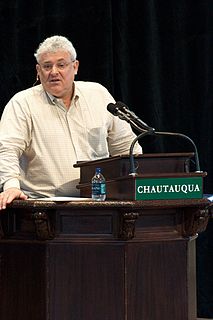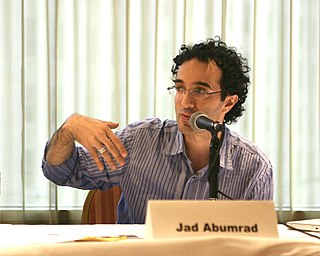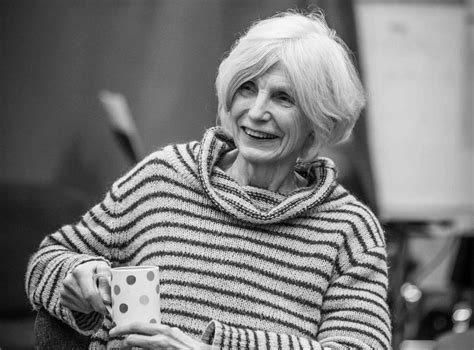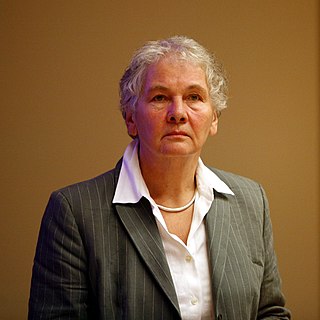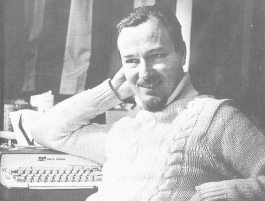Top 647 Genes Quotes & Sayings - Page 11
Explore popular Genes quotes.
Last updated on April 15, 2025.
If, as the dowager had said, we are nothing but gene carriers, why do so many of us have to lead such strangely shaped lives? Wouldn't our genetic purpose-to transmit DNA-be served just as well if we lived simple lives, not bothering our heads with a lot of extraneous thoughts, devoted entirely to preserving life and procreating? Did it benefit the genes in any way for us to lead such intricately warped, even bizarre, lives?
I agree with O'Toole that custom and comfort are impediments to change. However, it is important to recognize that resistance to change is logical as well. The new "change masters" literature seems to take change as the norm. It isn't. Humans naturally see change as risky because it is risky, just as mutations in genes are mostly destructive. You would not want to go to work were everything changed every week! The phone system, the office assignments, who reports to who, and the whole set of job expectations.
In actor's career, I had a fair amount of denial, which I think is possibly in the genes, where I just couldn't go to, "Maybe this won't work out." I just couldn't do it. My mind just refused to go there. I don't mean there weren't low periods. There were plenty. But I remember arriving in New York and I was maybe 32, and I didn't have an agent. I came from Chicago, where I had gone to school and worked and got my sea legs, so to speak, and I remember walking out of the subway, walking the streets, standing in front of the theater and saying, "I will work in this theater."
In our prehistoric past, we would have lived in extended families, surrounded by kin whose interests we might have wanted to promote because they shared our genes. Now we live in big cities. We are not among kin nor people who will ever reciprocate our good deeds. It doesn't matter. Just as people engaged in sex with contraception are not aware of being motivated by a drive to have babies, it doesn't cross our mind that the reason for do-gooding is based in the fact that our primitive ancestors lived in small groups.
Renegade scientists and totalitarian loonies are not the folks most likely to abuse genetic engineering. You and I are-not because we are bad but because we want to do good. In a world dominated by competition, parents understandably want to give their kids every advantage. ... The most likely way for eugenics to enter into our lives is through the front door as nervous parents ... will fall over one another to be first to give Junior a better set of genes.
You will find scientists who will tell you — and they deeply believe it — that we’re quantifiable. We are knowable. That if I can take a high enough resolution picture of all of you — not just your outsides, but your genes, your DNA, all the way down to your atoms — I can know everything about you and everything that you will be. There are people who believe this. And what this tells me is, no. No! All the way down, to the bottom of our thoughts, there’s just more mystery.
Even the favorite reviews, the audience response is the movie is too slow, deliberately slow. But for the Chinese audience, the biggest complaint is it happens too quick. I think the historical background that build into our genes is different. American people has never been occupied. The deep sadness and sentimentality, the cultural background that relates to melodrama that we relate to and grow up with, the propaganda, I didn't imagine the difference is so big. It's a very interesting cultural phenomenon.
I have always been with men who were type A, alpha males. I must exist because I'm with him, I'd think. But what made them what they were also often meant they were lacking empathy genes. And now I know I don't need an alpha male; I need somebody who's interesting. I'm not pretending that I'm 100 percent healed, so I might not know if a man is right for me right away, but it wouldn't take me seven years to figure it out. Maybe a month or two.
Of course genes can’t pull the levers of our behavior directly. But they affect the wiring and workings of the brain, and the brain is the seat of our drives, temperaments and patterns of thought. Each of us is dealt a unique hand of tastes and aptitudes, like curiosity, ambition, empathy, a thirst for novelty or for security, a comfort level with the social or the mechanical or the abstract. Some opportunities we come across click with our constitutions and set us along a path in life.
The male frog in mating season," said Crake, "makes as much noise as it can. The females are attracted to the male frog with the biggest, deepest voice because it suggests a more powerful frog, one with superior genes. Small male frogs—it's been documented—discover if they position themselves in empty drainpipes, the pipe acts as a voice amplifier and the small frog appears much larger than it really is." So?" So that's what art is for the artist, an empty drainpipe. An amplifier. A stab at getting laid.
A meme (rhymes with dream) is a unit of information (a catchphrase, a concept, a tune, a notion of fashion, philosophy or politics) that leaps from brain to brain. Memes compete with one another for replication, and are passed down through a population much the same way genes pass through a species. Potent memes can change minds, alter behavior, catalyze collective mindshifts and transform cultures. Which is why meme warfare has become the geopolitical battle of our information age. Whoever has the memes has the power.
I work in Hebrew. Hebrew is deeply inspired by other languages. Not now, for the last three thousand years, Hebrew has been penetrated and fertilized by ancient Semitic languages - by Aramaic, by Greek, by Latin, by Arabic, by Yiddish, by Latino, by German, by Russian, by English, I could go on and on. It's very much like English. The English language took in many many fertilizations, many many genes, from other languages, from foreign languages - Latin, French, Nordic languages, German, Scandinavian languages. Every language has influences and is an influence.
We have the power to defy the selfish genes of our birth and, if necessary, the selfish memes of our indoctrination. We can even discuss ways of deliberately cultivating and nurturing pure, disinterested altruism - something that has no place in nature, something that has never existed before in the whole history of the world. We are built as gene machines and cultured as meme machines, but we have the power to turn against our creators. We, alone on earth, can rebel against the tyranny of the selfish replicators.
A large animal needs a large area. If you protect that area, you're also protecting thousands of other plants and animals. You're saving all these species that future generations will want - you're saving the world for your children and your children's children. . . . The destruction of species is final. If you lose a species, you lose the genes, you lose all the potential drugs and potential foods that could be useful to the next generations. The ecosystems will not function as they have.
Before the scene, before the paragraph, even before the sentence, comes the word. Individual words and phrases are the building blocks of fiction, the genes that generate everything else. Use the right words, and your fiction can blossom. The French have a phrase for it - le mot juste - the exact right word in the exact right position.
Nature designed with a random set of genes and circumstances in which we were born. To be happy, we have to accept it and make the most of nature’s design. Are you? Goals will help you do that. I must add, don’t just have career or academic goals. Set goals to give you a balanced, successful life. I use the word balanced before successful. Balanced means ensuring your health, relationships, mental peace are all in good order.
Sexual reproduction exists solely as a means to defeat parasites. By mixing male and female genes, sex produces offspring not exactly like either the male or female - making each generation different from the last, and presenting a moving target to intruders intent on compromising this system. ... Even with this variation, parasites continue to pose a threat... and parasitism evolves and moves through any system - not just living things. The less variation there is in a system, the more readily parasites will evolve to infest it.
Schwartz's research suggests something important: we can stretch our personalities, but only up to a point. Our inborn temperaments influence us, regardless of the lives we lead. A sizeable part of who we are is ordained by our genes, by our brains, by our nervous systems. And yet the elasticity that Schwartz found in some of the high-reactive teens also suggests the converse: we have free will and can use it to shape our personalities.
Richard Nixon has never been one of my favorite people anyway. For years I've regarded his existence as a monument to all the rancid genes and broken chromosomes that corrupt the possibilities of the American Dream; he was a foul caricature of himself, a man with no soul, no inner convictions, with the integrity of a hyena and the style of a poison toad. The Nixon I remembered was absolutely humorless; I couldn't imagine him laughing at anything except maybe a paraplegic who wanted to vote Democratic but couldn't quite reach the lever on the voting machine.
... we find ourselves facing a rising tide of biologically active, synthetic organic chemicals. Some tinker with our hormones. Some attach themselves to our chromosomes and trigger mutations. Some cripple the immune system. Some light up our genes and so enhance the production of certain enzymes. If we could metabolize these chemicals into completely benign breakdown products and excrete them, they would pose less of a hazard. Instead, a good many of them accumulate.
I love this child. Red-haired - patient and gentle like her mother - fey and funny like her father. When she giggles I can hear him when he and I were young. I am part of this child. It may be only because we share genes and that therefore smell familiar to each other.... It may be that a part of me lives in her in some important way.... But for now, it's jelly beans and 'Old MacDonald' that unite us.
Granted, we may try to help our own family members because they share our DNA. Or help someone else in expectation that they will help us later. But when you look at what we admire as the most generous manifestations of altruism, they are not based on kin selection or reciprocity. An extreme example might be Oskar Schindler risking his life to save more than a thousand Jews from the gas chambers. That's the opposite of saving his genes.
We look at the human body as a biochemical machine controlled by genes and therefore we see a mechanical aspect to life and then try to understand the nature of mechanics by looking at how the physical parts interact with each other. If you want to understand life you just look at it as a whole series of interactive chemical reactions. What we are leaving out is the invisible elements, the contributions of the invisible world, which are emphasized in the nature of quantum mechanics. Matter is energy and is a primary factor that must be considered because everything is ultimately energy.
Do you realize that there is nothing in our genes that tells us when to die? There are genetic codes that tell us how to grow, how to breathe, and how to sleep, but NOTHING that tells us to die. So why do we? Because we literally rust and decay our bodies from the inside out with poor food and lifestyle choices.
If the universe were just electrons and selfish genes, meaningless tragedies ... are exactly what we should expect, along with equally meaningless good fortune. Such a universe would be neither evil nor good in intention ... The universe we observe has precisely the properties we should expect if there is, at bottom, no design, no purpose, no evil and no good, nothing but blind pitiless indifference.
Books help to form us. If you cut me open, you will find volume after volume, page after page, the contents of every one I have ever read, somehow transmuted and transformed into me just as my genes and the soul within me make me uniquely me, so I am the unique sum of the books I have read. I am my literary DNA.
At the heart of the WTO is an assault on everything left standing in the commons, in the public realm. Everything is now for sale. Even those areas of life that we once considered sacred like health and education, food and water and air and seeds and genes and a heritage. It is all now for sale. Economic freedom - not democracy, and not ecological stewardship - is the defining metaphor of the WTO and its central goal is humanity's mastery of the natural world through its total commodification.
What we want is another sample of life, which is not on our tree of life at all. All life that we've studied so far on Earth belongs to the same tree. We share genes with mushrooms and oak trees and fish and bacteria that live in volcanic vents and so on that it's all the same life descended from a common origin. What we want is a second tree of life. We want alien life, alien not necessarily in the sense of having come from space, but alien in the sense of belonging to a different tree altogether. That is what we're looking for, "life 2.0."
There is nothing to learn about love. Everything is already there, in our genes, in our nature. We don't have to learn anything except what we invent in this world of illusion. We search for love outside ourselves when love is all around us. Love is everywhere, but we don't have the eyes to see...Your heart can create any amount of love, not just for yourself, but for the whole world. When we know that our heart is a magical kitchen, we are always generous and our love is completely unconditional.
The smell of factory farms . . . many notice these places only when the odours reach their homes, affecting their own quality of life. We create these animals for our profit and pleasure, playing with their genes, violating their dignity as living creatures, forcing them to lie and live in their own urine and excrement, turning pens into penitentiaries and frustrating their every desire except what is needed to keep them breathing and breeding. And then we complain about the smell.
We have the same genetic code for all living creatures. We have a large number of genes that are manifestly the same, but with detail differences - they look like different drafts of the same book. In extreme cases, like a human and a beetroot, it's like the difference between Matthew and Luke's Gospel - clearly they tell the same story, but with different words. Whereas with a human and a chimp, it's like two different printings of Matthew, with a few typos in one.
Perhaps, you know, new laws, new domains of potential openness are occurring as the universe ages, and complexity previously disallowed is now possible, and we are that complexity. We are nature moving out of its genetic phase - a phase under the control of chemical genes, which are physical structures, in to an epigenetic phase, a phase of culture ruled by codes, transformable culturally confined codes - mathematics, religion, philosophy, art, dance, humor.
Parasites are not only incredibly diverse; they are also incredibly successful. There are parasitic stretches of DNA in your own genes, some of which are called retrotransposons. Many of the parasitic stretches were originally viruses that entered our DNA. Most of them don't do us any harm. They just copy and insert themselves in other parts of our DNA, basically replicating themselves. Sometimes they hop into other species and replicate themselves in a new host. According to one estimate, roughly one-third to one-half of all human DNA is basically parasitic.
In systemic searches for embryonic lethal mutants of Drosophila melanogaster we have identified 15 loci which when mutated alter the segmental patterns of the larva. These loci probably represent the majority of such genes in Drosophila. The phenotypes of the mutant embryos indicate that the process of segmentation involves at least three levels of spatial organization: the entire egg as developmental unit, a repeat unit with the length of two segments, and the individual segment.
Take care of your inner beauty, your spiritual beauty, and that will reflect in your face. We have the face we created over the years. Every bad deed, every bad fault will show on your face. God can give us beauty and genes can give us our features, but whether that beauty remains or changes is determined by our thoughts and deeds.
What i'm trying to tell you," Min said, "is that im going to grow up to be one of those chubby old ladies. It's in my genes. Like self raising flour. i'm going to pouf." "thats going to work out well for me," Cal said. "because i'm going to grow up to be one of those horny old men who chases chubby old ladies around the couch.
If you inhale a millionth of a gram of plutonium, the surrounding cells receive a very, very high dose. Most die within that area, because it's an alpha emitter. The cells on the periphery remain viable. They mutate, and the regulatory genes are damaged. Years later, that person develops cancer. Now, that's true for radioactive iodine, that goes to the thyroid; cesium-137, that goes to the brain and muscles; strontium-90 goes to bone, causing bone cancer and leukemia.
Mr L Prosser was, as they say, only human. In other words he was a carbon-based life form descended from an ape. More specifically he was forty, fat and shabby and worked for the local council. Curiously enough, though he didn't know it, he was also a direct male-line descendant of Genghis Khan, though intervening generations and racial mixing had so juggled his genes that he had no discernible Mongoloid characteristics, and the only vestiges left in Mr L Prosser of his mighty ancestry were a pronounced stoutness about the tum and a predilection for little fur hats.
The kitten was six weeks old. It was enchanting, a delicate fairy-tale cat, whose Siamese genes showed in the shape of the face, ears, tail, and the subtle lines of its body. [...] She sat, a tiny thing, in the middle of a yellow carpet, surrounded by five worshipppers, not at all afraid of us. Then she stalked around that floor of the house, inspecting every inch of it, climbed up on to my bed, crept under the fold of a sheet, and was at home.
There's one bright spot in the generally gloomy picture know as the Pacific Conflict Zone. According to my calculations, by the year 2500 or so we should have killed off every last member of our species who is stupid enough to take part in so futile a pastime as this war between "ideals," and with luck they won't have left their genes behind because they'll typically have been killed at an age when society thinks they're too young to assume the responsibility of childbearing. After that we may get some peace and quiet for a change.
The drive to be useful is encoded in our genes. But when we gather in very large numbers, as in the modern nation-state, we seem capable of levels of folly and self-destruction to be found nowhere else in all of nature. But if we keep at it and keep alive, we are in for one surprise after another. We can build structures for human society never seen before, thoughts never heard before, music never heard before.
There is a balance, a kind of standoff between the time continuum and the human entity, our frail bundle of soma and psyche. We eventually succumb to time, it's true, but time depends on us. We carry it in our muscles and genes, pass it on to the next set of time-factoring creatures, our brown-eyed daughters and jug-eared sons, or how would the world keep going. Never mind the time theorists, the cesium devices that measure the life and death of the smallest silvery trillionth of a second.... We were the only crucial clocks, our minds and bodies, way stations for the distribution of time.
The most important factors for a long life, I think, are partly in the genes; number two is lifestyle, which includes healthy diet and regular exercise. I walk, run and swim every day. However, I think too much exercise is also unhealthy because of over-stress; sometimes people who exercise too many hours per day die early.
If they survive, today's children will inherit a world that our fathers and grandfathers have ravaged, where the seas are acidic cesspools that the whales have fled, where rain forests are Indian memories never to return, and where human greed has plundered Mother Earth's innards and turned human genes into factories for profit. They will inherit a diminished planet where fresh water is increasingly rare, and where fresh air is a commodity... We live in a world that fears and hates its young. How else can one explain the bequest of such a foul, polluted, and hollow inheritance?
There is an obvious evolutionary explanation for the scarcity of altruistic saints: Without a strong predilection for their own interests, our ancestors would have been unlikely to survive, reproduce, and give their own offspring a chance of doing the same. Now conditions have changed and for most of us, surviving and reproducing isn't such a struggle but we still carry the genes of our ancestors and they influence - not determine, but influence - our behavior.
We are going to die, and that makes us the lucky ones. Most people are never going to die, because they are never going to be born. The number of people who could be here, in my place, out number the sand grains in the Sahara. If you think about all the different ways in which our genes could be permuted, you and I are quite grotesquely lucky to be here. The number of events that had to happen in order for you to exist, in order for me to exist... we are privileged to be alive and nd we should make the most of our time on this world.




